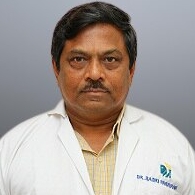
DR BADRI NARAYANA TUMULU
Cardiologist
- Fees: INR 1,200
-
Monday 10:00 AM - 1:00 PM
(See all timing)Monday 10:00 AM - 1:00 PM,
Tuesday 10:00 AM - 1:00 PM,
Wednesday 10:00 AM - 1:00 PM,
Thursday 10:00 AM - 1:00 PM,
Friday 10:00 AM - 1:00 PM,
Saturday 10:00 AM - 1:00 PM
Introduction
Dr Badri Narayana Tumulu is one of the best Cardiologist in Hyderabad and is currently associated with Apollo Health City Jubilee Hills Hyderabad.
Hospital Associations
Apollo Health City Jubilee Hills
Services/Interest
- Heart Disease Diagnosis
- Angioplasty
- Coronary Artery Bypass
- Cardiac Catheterization
- Pacemaker Implantation
- Electrocardiogram (ECG)
- Echocardiography
- Stress Test
- Heart Rhythm Management
- Heart Failure Treatment
- Cardiac Rehabilitation
- Cardiac Medication Management
- Valve Repair/Replacement
- Hypertension Management
- Cardiac Risk Assessment
Experience
Dr Badri Narayana Tumulu is one of the best Cardiologist in Hyderabad and has an overall experience of 36 years in the field.
Education
Dr Badri Narayana completed his MBBS from VSS Medical College, Orissa in 1982. Dr Badri Narayana completed his MD (General Medicine) from MKCG Medical College, Orissa in 1997. Dr Badri Narayana completed his DM (Cardiology) from SCB Medical College, Orissa in 2004.
I Speak
English, Hindi, Telugu, Oriya
Feedback For Dr Badri Narayana Tumulu
Write FeedbackApollo Health City Jubilee Hills Hyderabad Timing
Monday - Friday
10:00 AM - 1:00 PM
Saturday
10:00 AM - 1:00 PM
Who is a cardiologist?
A cardiologist is a trained medical professional with special training and skill in finding, treating and preventing diseases of the heart and blood vessels, which is the cardiovascular system.
Cardiology is a complex field, so cardiologists specialize in different areas. All cardiologists are clinical cardiologists as they focus on the diagnosis, medical management, and prevention of cardiovascular disease. Some clinical cardiologists specialize in pediatric cardiology, so they also diagnose and treat heart problems in children. An adult cardiologist is the clinical cardiologists who treat only adult patients. Other clinical cardiologists who specialize in interventional procedures like angiography, angioplasty, stenting, and TAVI are called the interventional cardiologist.
Why should I see a cardiologist?
With statistics like heart disease being among the number one killers, there is no reason for anyone to not to be worried. General cardiologists are practitioners that focus on the heart, so If you are at risk for heart disease, a routine check-up with a cardiologist can help you to be on top of your heart health.
And in case you are wondering how to be sure that you are at risk for heart disease, then you can look at the certain common symptoms shown by your body that usually point to heart disease. Whenever you feel chest pain that is radiating towards the left side or to the back of your body, you should immediately consult an experienced cardiologist. You should also consult a heart doctor when you experience severe pressure in the chest, shortness of breath while walking and continues while you are at rest, Irregular heartbeats leading to palpitations, sudden clenching pain in jaws, or when you undergo excessive sweating continuously for a long period of time without any exercise.
What kind of tests do cardiologists do?
Cardiologists perform the following tests:
- Cardiac CT scan,
- Magnetic resonance angiography (MRA) of the heart,
- Electrocardiogram (ECG),
- Stress test (also called treadmill or exercise ECG),
- Echocardiogram,
- Magnetic resonance imaging (MRI) of the heart,
- Cardiac catheterization,
- Electrophysiology study,
- Tilt table test,
- Loop Recorder,
- Transesophageal echocardiogram (TEE),
- Positron emission tomography (PET) scan, etc.
How often should you get your heart checked?
You should get your heart checked as often as possible, and this is especially true when your family has a risk for heart disease. You should get your blood pressure checked every year, and according to the American Heart Association, the screening tests for coronary artery disease should begin at age 20, cholesterol test at age of 25, and blood glucose screening should begin at age 45.
Is there a difference between a cardiologist and a cardiac surgeon?
Cardiologists are doctors who specialize in cardiovascular disease and are able to treat conditions ranging from severe hypertension to elevated cholesterol to heart rhythm problems. Cardiologists also are able to perform procedures that both help diagnose and treat many cardiac conditions, for example, cardiologists can perform stress tests to uncover coronary disease, conduct echocardiograms to diagnose holes in the heart or other issues with heart valves; they may even order monitoring of the heart to uncover rhythm issues like atrial fibrillation. In addition, to treat these specific problems, specialized cardiologists like Interventional cardiologists can close small holes in the heart, place stents in clogged arteries, and place specialized devices in the heart. Cardiac surgeons come from a very different background and are usually the general surgeons who chose to further specialize as cardiac surgeons and limit their practice to the heart arteries and heart valves.
Do you see a cardiologist for high blood pressure?
If you test on the high side for blood pressure and yet your regular doctor says you're blood pressure is controllable, you could still benefit from seeing a preventive cardiologist. Preventive cardiologists are a special type of clinical cardiologists whose goal is to prevent cardiovascular diseases and to reduce the burden of them in populations and improve the quality of life and life expectancy in individuals with such diseases.
What happens in a cardiologist appointment?
In your first cardiologist appointment, you are usually greeted by a member of the nursing staff who measures your weight and height in order to calculate your body mass
(BMI). At this stage, you are normally asked to go for one of the following tests:
- Electrocardiography (ECG) which is a tracing of the heart carried out by attaching leads
- Echocardiograph (ECHO), a scan of the heart.
- Both of these tests are simple and painless.
